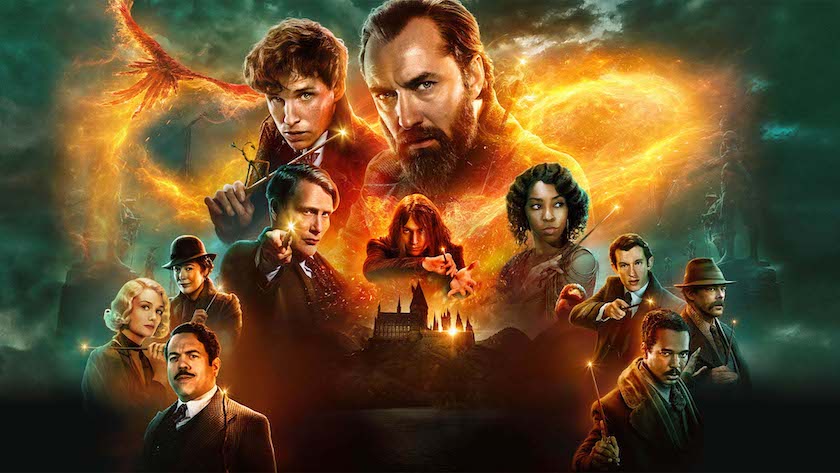
Directing his seventh film in the Harry Potter universe, David Yates course-corrects the convoluted and disturbingly dark misfire that was The Crimes of Grindelwald (2018), crafting a breezy romp that is as poignant as it is bruising.
Picking up after the extravagant events of the last installment, an upcoming election finds evil wizard Grindelwald (Mads Mikkelsen, replacing Johnny Depp from the previous film(s)) – a power-hungry, anti-muggle figure on the run from magical authorities – curry political favour amongst magickind.
With time pressing and the odds of a Grindelwald victory manipulated in his favour, a crackpot team of magical heroes – assembled by renowned Hogwarts Professor and estranged partner of Grindelwald’s, Albus Dumbledore (Jude Law) – set a plan in motion to save magical and non-magical worlds.
Where The Crimes of Grindelwald became an array of incongruous decisions explained by even more baffling exposition, TSoD rights the wrongs of the past in the return of longtime Harry Potter screenwriter, Steve Kloves. Kloves, who shares screenwriting credits with the disgraced Harry Potter author, strikes the right balance in terms of playfulness and grit, imbuing upon the plot a whimsical tone that has not been seen since the first Fantastic Beasts film.
Amidst all of the sweeping elements of the film – James Newton Howard’s soaring score, rescue operations peppered with light-hearted hijinks, the discovery of a captivating creature and the engrossing joy of watching a spell take effect – exists a heartbreaking story of love and loss, brought to life impeccably through Law and Mikkelsen’s pitch-perfect performances. Bound by a magical pact that prevents the two from dueling, this motif presented as a pendant that strangles Dumbledore’s hand upon intense thought, the two grand wizards reckon with lingering feelings brought on by their contrasting moral compasses. It is a mood beautifully evoked via wistful stares and moments of heartbreaking affection: a heartbeat, a memory, a softness in inflection.
Other performances, including familiar faces – magizoologist Newt Scamander (Eddie Redmayne), his headstrong brother Theseus (Callum Turner), Credence Dumbledore (Ezra Miller), scene-stealing muggle Jacob Kowalski (Dan Fogler), and flip-flopping mind-reader Queenie (Alison Sudol) – and newcomers a la the adept witch Professor Hicks (Jessica Williams), add fullness to the world.
Efforts by the film to amend the wonky foundations brought up by the film’s past feel more like renovations than they do rebuilds. They are in large part seamlessly woven into the story. Unfortunately for Queenie, who had for the plot’s sake bafflingly abandoned her friends under the lure of the dark side, the battle to forgive and save her character has already passed.
Where The Crimes of Grindelwald proved to be punishingly complex, inappropriately connecting magical fiction with the horrors of the past, TSoD more appropriately offers a scathing take on present-day politics.
It is well woven, but not without the occasional heaviness that feels as if the film is winking to the audience to let them know it has been listening to the news over the past five years. That said, there is an irony to the film’s theme around surfacing radical thoughts. (When the film suggests we should allow an opposing voice to be heard, it is hard to tell, given off-screen events, whether it is making a special plea.)
It is not lost on this reviewer that the Harry Potter universe, once a beloved franchise that prided itself on inclusivity, now represents a place of hurt due to its embattled author’s harmful rhetoric. The new film, regardless of its merit, will bring up deep feelings for many, with the inevitable box office taking of The Secrets of Dumbledore reflecting the brand power of a series distancing itself from its creator.
While pain and loss weigh heavily on The Secrets of Dumbledore, enchantment and adventure make a welcome return to the Fantastic Beasts series.










